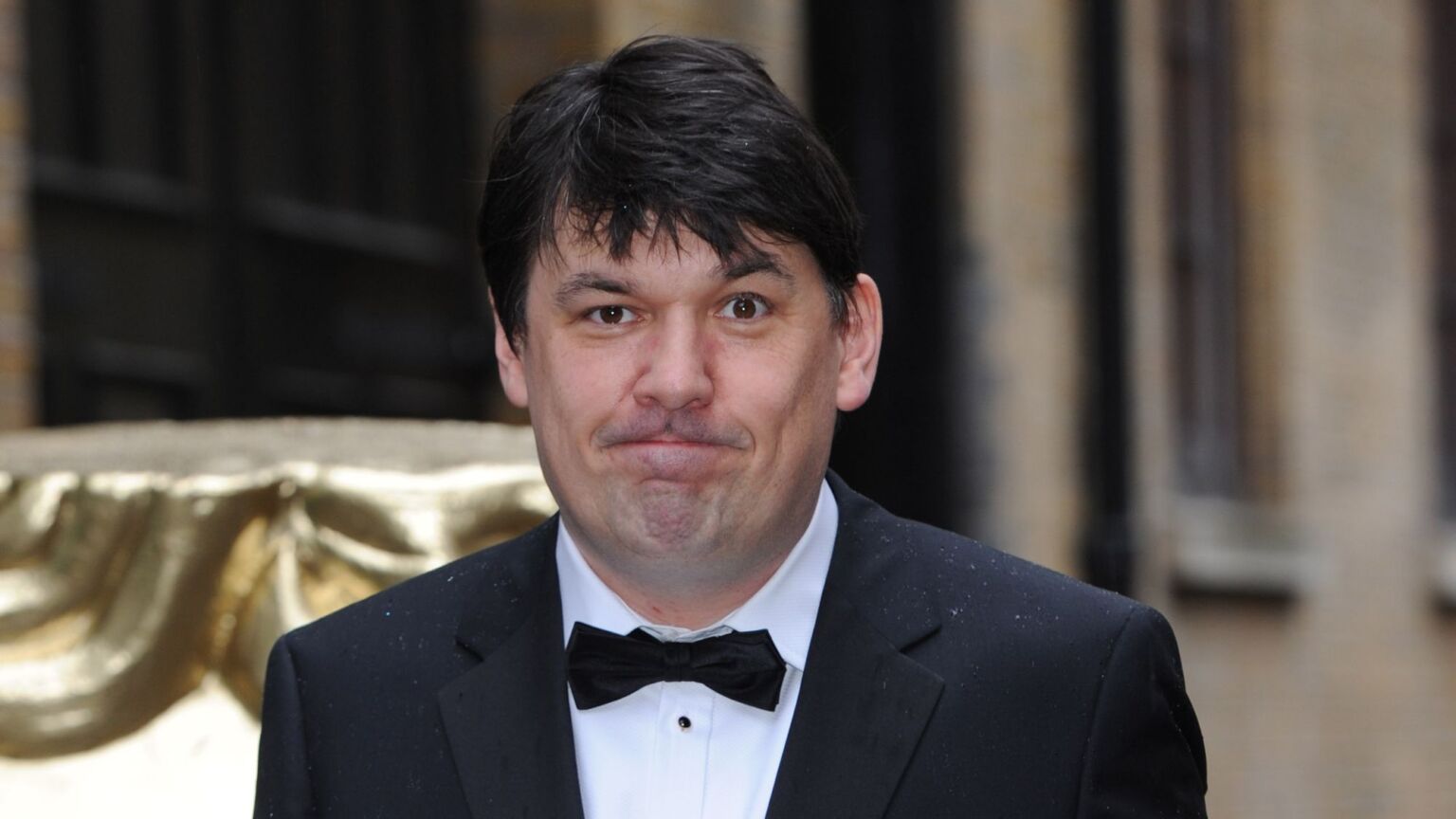Graham Linehan’s arrest shows we need a UK First Amendment
Unless we have robust protections for free speech, the thoughtpolice will continue to run amok.

Want unlimited, ad-free access? Become a spiked supporter.
The co-creator of Father Ted, Graham Linehan, was arrested at Heathrow Airport on Monday on suspicion of ‘inciting violence’. His crime? Criticising trans ideology on social media.
No sooner had Linehan disembarked his flight from Arizona than he was apprehended by armed police. In a post on Substack, he explained that his arrest was for three posts on X. One of the tweets read: ‘If a trans-identified male is in a female-only space, he is committing a violent, abusive act. Make a scene, call the cops and if all else fails, punch him in the balls.’
The arrest at Heathrow was made by officers from the Met Police Aviation Unit. There are only 5,700 or so deployable armed police officers in England and Wales at present. Yet five of them were sent to arrest Linehan for his social-media posts. However you slice it, this was complete overkill – and a massive waste of police time. Worse, as a condition of bail, Linehan has been banned from using X. ‘A legal gag order designed to shut me up’ is how he describes it.
Britons are becoming all too accustomed to having their free speech curtailed. Linehan is just one of thousands of people who have been arrested in the UK for things they have said online. According to custody data obtained by The Times, officers from 37 police forces made 12,183 arrests in 2023. This is the equivalent of about 33 arrests per day.
Those arrests were made predominantly under Section 127 of the Communications Act 2003, as well as Section 1 of the Malicious Communications Act 1998. These laws make it an offence to post anything that is ‘grossly offensive or of an indecent, obscene or menacing character’ – an entirely subjective standard that is near impossible to impose fairly.
Those aren’t the only laws we have to contend with. In October last year, Lucy Connolly, a 42-year-old mother from Northampton, was sentenced to 31 months in prison for a single inflammatory social-media post. She was charged and pleaded guilty to ‘publishing material intending to stir up racial hatred’, contrary to Section 19 of the Public Order Act 1986.
This section of the act states that ‘a person who publishes or distributes written material which is threatening, abusive or insulting is guilty of an offence if he intends thereby to stir up racial hatred’ or ‘having regard to all the circumstances racial hatred is likely to be stirred up thereby’. It is, quite plainly, a legal absurdity. So vague is the language used that virtually any interpretation of ‘insulting’ could potentially be criminalised.
All of these laws must be urgently amended. Laws banning ‘hatred’ or ‘insult’ prioritise personal feelings over objective harm. But changing the law won’t be enough. These poorly worded pieces of legislation have existed for years, decades even – yet it is only in recent years that they’ve been enforced so vociferously. Since the pandemic, arrests for speech on social media have surged by almost 60 per cent.
Clearly, there has been a sea change in cultural attitudes to free speech – and not for the good. The view that the written word can, somehow, cause a person to commit a violent act is now conventional wisdom among the establishment. Bizarre notions like ‘hate speech’ and ‘words wound’ have become alarmingly entrenched.
What happened to ‘sticks and stones’? We must be firm about the fact that speech is not violent. Violence is innately physical and the police should protect us from it. But the state should have no authority to manage the words that come out of our mouths, apart from some highly exceptional cases, such as genuine incitement to violence.
It is a great shame that in the UK – a nation that once exported the very idea of liberty to the world – comedians are arrested for jokes and mothers for angry X posts. It is more important now than ever to defend the freedoms that once made Britain so great. We must protect the right to express one’s views, no matter how offensive or grotesque.
There is a solution. The First Amendment to the US Constitution protects the right to freedom of expression from government censorship. Had Graham Linehan, Lucy Connolly and Britain’s countless other speech criminals said what they said across the pond, they would never have been put in cuffs.
The threshold at which protected speech becomes illegal incitement is extremely high, as established by the US Supreme Court in Brandenburg vs Ohio. In the summer of 1964, Ku Klux Klan member Clarence Brandenburg addressed a small gathering in rural Ohio, where he made vague threats against the US government if it continued to ‘suppress the white, Caucasian race’. He was convicted, fined $1,000 and sentenced to one to 10 years in prison. Brandenburg filed an appeal, claiming his First Amendment rights had been violated.
In a landmark decision, the Supreme Court sided with Brandenburg. The justices said it was within his First Amendment rights to make his speech, articulating what is now known as the Brandenburg Test: evidence of ‘imminent lawless action’ as a hard rule when defining incitement. Speech could only be punished if it presented a threat that was likely to actually happen, and to happen soon. Neither Linehan nor Connolly’s posts would have come close to this threshold. After all, even in the most ungenerous reading, ‘punch him in the balls’ can hardly be construed as an explicit incitement to violence.
Britain is sliding into dangerous territory. Words are treated as crimes and courts are keener to protect hurt feelings than to defend individual liberty. The UK desperately needs its own First Amendment. We need a clear constitutional guarantee that no government or police officer can decide which opinions are too offensive to be said aloud. Without such protection, our right to express ourselves will remain hostage to the sensitivities of the moment.
Reem Ibrahim is the Head of Media and Linda Whetstone Scholar at the Institute of Economic Affairs
£1 a month for 3 months
You’ve hit your monthly free article limit.
Support spiked and get unlimited access.
Support spiked – £1 a month for 3 months
spiked is funded by readers like you. Only 0.1% of regular readers currently support us. If just 1% did, we could grow our team and step up the fight for free speech and democracy.
Become a spiked supporter and enjoy unlimited, ad-free access, bonus content and exclusive events – while helping to keep independent journalism alive.
———————————————————————————————————————————–
Exclusive January offer: join today for £1 a month for 3 months. Then £5 a month, cancel anytime.
———————————————————————————————————————————–
Monthly support makes the biggest difference. Thank you.









Comments
Want to join the conversation?
Only spiked supporters and patrons, who donate regularly to us, can comment on our articles.